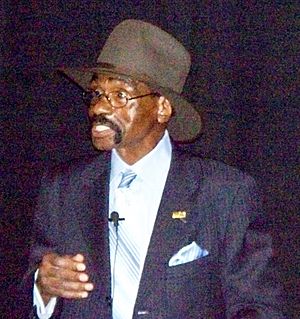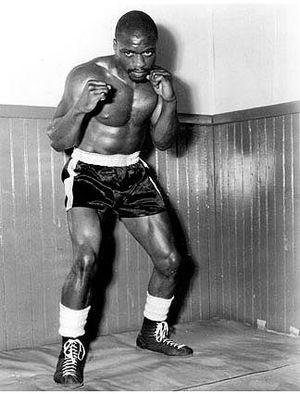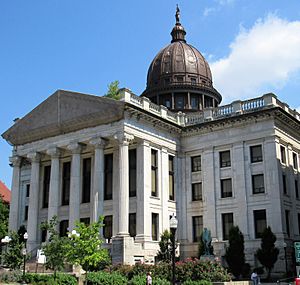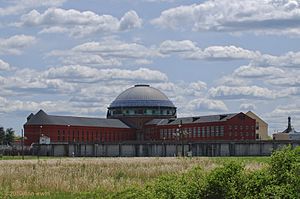Rubin Carter facts for kids
Quick facts for kids
Rubin Carter
|
|||||||||||||||||||||||||
|---|---|---|---|---|---|---|---|---|---|---|---|---|---|---|---|---|---|---|---|---|---|---|---|---|---|

Carter at Bunker Hill Community College in 2011
|
|||||||||||||||||||||||||
| Born | May 6, 1937 Clifton, New Jersey, U.S.
|
||||||||||||||||||||||||
| Died | April 20, 2014 (aged 76) Toronto, Ontario, Canada
|
||||||||||||||||||||||||
| Citizenship |
|
||||||||||||||||||||||||
| Spouse(s) |
|
||||||||||||||||||||||||
| Children | 2 | ||||||||||||||||||||||||
|
|||||||||||||||||||||||||
| Signature | |||||||||||||||||||||||||
Rubin "Hurricane" Carter (born May 6, 1937 – died April 20, 2014) was a famous American-Canadian middleweight boxer. He was wrongly found guilty and sent to prison for murder. After almost 20 years, he was finally set free. This happened because a special legal request, called a writ of habeas corpus, proved his innocence.
In 1966, Carter and his friend, John Artis, were arrested. They were accused of killing three people at a bar in Paterson, New Jersey. Police stopped their car twice that night. The first time, they were allowed to go. But 45 minutes later, they were stopped again and arrested.
Carter and Artis were questioned for a long time. They were released, then arrested again weeks later. In 1967, they were found guilty and given life sentences. A second trial in 1976 also found them guilty. But in 1985, these verdicts were overturned. Prosecutors tried to appeal to the highest court in the U.S., but they lost. They decided not to try the case a third time.
While in prison, Carter wrote his life story, called The Sixteenth Round. It was published in 1974. His story inspired the 1975 song "Hurricane" by Bob Dylan. It also led to the 1999 movie The Hurricane, where Denzel Washington played Carter. From 1993 to 2005, Carter worked to help other people who were wrongly convicted. This was for an organization now called Innocence Canada.
In 2019, a 13-part BBC podcast series, The Hurricane Tapes, focused on his case. It used interviews, old case notes, and recordings of Carter himself.
Contents
Early Life and Army Days
Rubin Carter was born in Clifton, New Jersey, in 1937. He was one of seven children. In 1954, he joined the United States Army. He was sent to West Germany. While there, Carter started boxing for the Army. He left the Army in 1956. Soon after, he returned home and was sent to prison for other crimes.
Boxing Career
After leaving prison in September 1961, Carter became a professional boxer. He was shorter than most middleweight boxers. But his strong, aggressive style made him popular. He often won fights by knocking out his opponents early. This earned him the nickname "Hurricane."
Carter quickly became well-known in the boxing world. He beat many top middleweight fighters. In July 1963, The Ring magazine listed him as one of the "Top 10" middleweight boxers. By the end of 1965, he was ranked number five.
In 1963, he won four of his six fights. On December 20, he surprised everyone by beating former world champion Emile Griffith. Carter knocked Griffith down twice in the first round and won by technical knockout. This win made him the number three contender for the world middleweight title.
Carter won two more fights in 1964. One was against future heavyweight champion Jimmy Ellis. Then, on December 14, he fought Joey Giardello for the world middleweight title. Carter landed some strong punches, but Giardello took control of the fight. The judges all agreed that Giardello won.
After that fight, Carter's ranking started to drop. In 1965, he fought nine times, winning five. But he lost three important fights against other top boxers. One of these was against Dick Tiger, who knocked Carter down three times. Carter later said it was the "worst beating" of his life.
Rubin Carter's boxing record was 27 wins (19 by knockout), 12 losses, and one draw in 40 fights. In 1993, he received an honorary championship belt. He was also added to the New Jersey Boxing Hall of Fame.
Arrest and First Conviction
On June 17, 1966, two men shot people at a bar in Paterson, New Jersey. Three people died. A fourth person was injured but survived. Ten minutes later, police stopped Carter and John Artis in a car. They were coming from a nearby nightclub. The police let them go at first. But after dropping off a third person, Carter and Artis were stopped again and arrested.
Witnesses told police they saw two Black men leave the bar and get into a white car. One witness, Alfred Bello, later changed his story. He said he saw Carter and Artis outside the bar. Another person, Arthur Bradley, also claimed Carter was one of the attackers. Based on these statements, Carter and Artis were charged.
However, there were problems with the evidence. The descriptions given by witnesses were different. There was no physical evidence, like fingerprints, linking Carter or Artis to the crime. The weapons used in the shooting were never found. Also, Carter and Artis passed lie detector tests at first.
After being questioned for 17 hours, Carter and Artis were released. They even appeared before a grand jury, which decided there wasn't enough evidence to charge them. But months later, Bello changed his story again. He identified Artis, and Bradley identified Carter. This led to their arrest and charges.
At the trial, the defense team pointed out how the witness stories didn't match. They also had witnesses who said Carter and Artis were at the nightclub when the shootings happened. But the jury, which was all white, found both men guilty of murder. They were given life sentences.
Retrial and Release
In 1974, Alfred Bello and Arthur Bradley said they had lied in the first trial. They said their identifications of Carter and Artis were false. This led to a request for a new trial. The judge denied it.
But many people started supporting Carter. Famous boxer Muhammad Ali helped. Bob Dylan wrote a song called "Hurricane" in 1975, saying Carter was innocent. Dylan even performed the song at the prison where Carter was held.
The New Jersey Supreme Court later agreed that Carter and Artis deserved a new trial. They said that important information about deals made with witnesses was not shared with the defense. This could have changed what the jury believed. So, the original convictions were canceled.
In 1976, Carter and Artis had a new trial. Alfred Bello repeated his story from the first trial. The defense again showed how witness stories were inconsistent. They also had witnesses who confirmed Carter's alibi. Despite this, the jury again found Carter and Artis guilty. They received the same sentences.
John Artis was released from prison in 1981. Carter's lawyers kept fighting for him.
Freedom at Last
In 1985, Carter's lawyers took his case to a federal court. Judge Haddon Lee Sarokin ruled that the first trials were unfair. He said they were based on "racism rather than reason, and concealment rather than disclosure." He canceled the convictions.
Rubin Carter, who was 48 years old, was set free in November 1985. Prosecutors tried to appeal this decision, but they lost. The highest court in the U.S. refused to hear their case.
This meant prosecutors could have tried Carter a third time. But they decided not to. They said it was too hard to try the case again after almost 22 years. A judge officially dismissed the charges, finally ending the legal battle.
Life After Prison
After his release, Rubin Carter moved to Toronto, Ontario, and became a Canadian citizen. From 1993 to 2005, he was the leader of the Association in Defence of the Wrongly Convicted (AIDWYC). This group helps people who have been wrongly put in prison.
Carter often gave speeches to inspire others. He received two honorary law degrees in 2005. These awards recognized his important work with AIDWYC and the Innocence Project.
Later Years and Legacy
In March 2012, Rubin Carter shared that he had terminal prostate cancer. Doctors gave him only a few months to live. His friend, John Artis, lived with him and cared for him. On April 20, 2014, Carter passed away at age 76.
In his final months, Carter worked to help David McCallum, another man wrongly imprisoned. Carter wrote an article asking for McCallum's case to be reviewed. He believed McCallum's conviction was also unfair. Just two months after Carter's death, David McCallum was set free.
John Artis, Carter's friend and co-accused, died in 2021 at the age of 75.
In Popular Culture
Rubin Carter's powerful story has inspired many works:
- The 1975 Bob Dylan song "Hurricane" told his story and said he was innocent. Carter also appeared in Dylan's 1978 movie Renaldo and Clara.
- The 1999 movie The Hurricane, directed by Norman Jewison, starred Denzel Washington as Carter. The film showed Carter's accusation, trials, and time in prison. Denzel Washington won a Golden Globe Award for Best Actor – Motion Picture Drama for his role. He was also nominated for an Academy Award for Best Actor.
Professional Boxing Record
| 40 fights | 27 wins | 12 losses |
| By knockout | 19 | 1 |
| By decision | 8 | 11 |
| Draws | 1 | |
| No. | Result | Record | Opponent | Type | Round, time | Date | Location | Notes |
|---|---|---|---|---|---|---|---|---|
| 40 | Loss | 27–12–1 | Juan Carlos Rivero | PTS | 10 | Aug 6, 1966 | Rosario, Argentina | |
| 39 | Draw | 27–11–1 | Wilbert McClure | MD | 10 | Mar 8, 1966 | Sports Arena, Toledo, Ohio, US | |
| 38 | Win | 27–11 | Ernest Burford | KO | 8 (10) | Feb 26, 1966 | Orlando Stadium, Johannesburg, South Africa | |
| 37 | Loss | 26–11 | Stan Harrington | UD | 10 | Jan 25, 1966 | Honolulu International Center, Honolulu, Hawaii, US | |
| 36 | Loss | 26–10 | Johnny Morris | SD | 10 | Jan 18, 1966 | Civic Arena, Pittsburgh, Pennsylvania, US | |
| 35 | Win | 26–9 | Wilbert McClure | SD | 10 | Jan 8, 1966 | Aragon Ballroom, Chicago, Illinois, US | |
| 34 | Win | 25–9 | Joe N'Gidi | TKO | 2 (10) | Sep 18, 1965 | Wembley Stadium, Johannesburg, South Africa | |
| 33 | Loss | 24–9 | Luis Manuel Rodríguez | UD | 10 | Aug 26, 1965 | Olympic Auditorium, Los Angeles, California, US | |
| 32 | Win | 24–8 | Fate Davis | TKO | 1 (10), 1:26 | Jul 14, 1965 | Armory, Akron, Ohio, US | |
| 31 | Loss | 23–8 | Dick Tiger | UD | 10 | May 20, 1965 | Madison Square Garden, New York City, New York, US | |
| 30 | Win | 23–7 | Johnny Torres | TKO | 8 (10), 1:38 | Apr 30, 1965 | Armory, Paterson, New Jersey, US | |
| 29 | Loss | 22–7 | Harry Scott | PTS | 10 | Apr 20, 1965 | Royal Albert Hall, Kensington, London, England | |
| 28 | Win | 22–6 | Harry Scott | TKO | 9 (10) | Mar 9, 1965 | Royal Albert Hall, Kensington, London, England | |
| 27 | Win | 21–6 | Fabio Bettini | KO | 10 (10) | Feb 22, 1965 | Palais des Sports, Paris, France | |
| 26 | Loss | 20–6 | Luis Manuel Rodríguez | UD | 10 | Feb 12, 1965 | Madison Square Garden, New York City, New York, US | |
| 25 | Loss | 20–5 | Joey Giardello | UD | 15 | Dec 14, 1964 | Convention Hall, Philadelphia, Pennsylvania, US | For WBA, WBC, and The Ring middleweight titles |
| 24 | Win | 20–4 | Clarence James | TKO | 1 (10), 1:54 | Jun 24, 1964 | Sports Arena, Los Angeles, California, US | |
| 23 | Win | 19–4 | Jimmy Ellis | UD | 10 | Feb 28, 1964 | Madison Square Garden, New York City, New York, US | |
| 22 | Win | 18–4 | Emile Griffith | TKO | 1 (10), 2:13 | Dec 20, 1963 | Civic Arena, Pittsburgh, Pennsylvania, US | |
| 21 | Loss | 17–4 | Joey Archer | SD | 10 | Oct 25, 1963 | Madison Square Garden, New York City, New York, US | |
| 20 | Win | 17–3 | Farid Salim | UD | 10 | Sep 14, 1963 | Civic Arena, Pittsburgh, Pennsylvania, US | |
| 19 | Win | 16–3 | George Benton | SD | 10 | May 25, 1963 | Madison Square Garden, New York City, New York, US | |
| 18 | Loss | 15–3 | Jose Gonzalez | TKO | 6 (10) | Mar 30, 1963 | Madison Square Garden, New York City, New York, US | |
| 17 | Win | 15–2 | Gomeo Brennan | UD | 10 | Feb 2, 1963 | Madison Square Garden, New York City, New York, US | |
| 16 | Win | 14–2 | Holley Mims | UD | 10 | Dec 22, 1962 | Madison Square Garden, New York City, New York, US | |
| 15 | Win | 13–2 | Florentino Fernández | KO | 1 (10), 1:09 | Oct 27, 1962 | Madison Square Garden, New York City, New York, US | |
| 14 | Win | 12–2 | Mel Collins | TKO | 5 (10), 0:42 | Oct 8, 1962 | Armory, Jersey City, New Jersey, US | |
| 13 | Win | 11–2 | Ernest Burford | TKO | 2 (10), 2:17 | Aug 4, 1962 | Madison Square Garden, New York City, New York, US | |
| 12 | Loss | 10–2 | Ernest Burford | UD | 8 | Jun 23, 1962 | Madison Square Garden, New York City, New York, US | |
| 11 | Win | 10–1 | Sugar Boy Nando | TKO | 3 (10), 2:07 | May 21, 1962 | St. Nicholas Arena, New York City, New York, US | |
| 10 | Win | 9–1 | Walter Daniels | TKO | 2 (10), 2:03 | Apr 30, 1962 | St. Nicholas Arena, New York City, New York, US | |
| 9 | Win | 8–1 | Johnny Tucker | TKO | 1 (8), 1:05 | Apr 16, 1962 | St. Nicholas Arena, New York City, New York, US | |
| 8 | Win | 7–1 | Jimmy McMillan | KO | 3 (6) | Mar 16, 1962 | Armory, Jersey City, New Jersey, US | |
| 7 | Win | 6–1 | Felix Santiago | KO | 1 (8), 1:38 | Feb 28, 1962 | State Garden, Union City, New Jersey, US | |
| 6 | Win | 5–1 | Tommy Settles | KO | 1 (6) | Feb 14, 1962 | State Garden, Union City, New Jersey, US | |
| 5 | Loss | 4–1 | Herschel Jacobs | PTS | 6 | Jan 19, 1962 | Gladiators' Arena, Totowa, New Jersey, US | |
| 4 | Win | 4–0 | Herschel Jacobs | PTS | 4 | Nov 17, 1961 | Gladiators' Arena, Totowa, New Jersey, US | |
| 3 | Win | 3–0 | Frank Nelson | TKO | 1 (4) | Oct 24, 1961 | Alhambra A.C., Philadelphia, Pennsylvania, US | |
| 2 | Win | 2–0 | Joey Cooper | KO | 2 (4) | Oct 11, 1961 | American Legion Arena, Reading, Pennsylvania, US | |
| 1 | Win | 1–0 | Pike Reed | SD | 4 | Sep 22, 1961 | Navy-Marine Corps Mem. Stadium, Annapolis, Maryland, US |
See also
 In Spanish: Rubin Carter para niños
In Spanish: Rubin Carter para niños
- List of wrongful convictions in the United States
- Romeo Phillion
- Steve Hearon
 | Ernest Everett Just |
 | Mary Jackson |
 | Emmett Chappelle |
 | Marie Maynard Daly |




